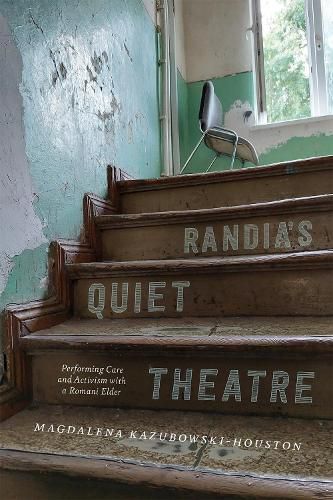Readings Newsletter
Become a Readings Member to make your shopping experience even easier.
Sign in or sign up for free!
You’re not far away from qualifying for FREE standard shipping within Australia
You’ve qualified for FREE standard shipping within Australia
The cart is loading…






Throughout Poland, tens of thousands of elderly people live with disabilities in four-storey walk-up apartment buildings. In many cases their children have emigrated; they live with loneliness, a lack of basic amenities, silence, and the absence of care. They are known as "prisoners of the fourth floor."
In Randia's Quiet Theatre Magdalena Kazubowski-Houston mixes autofiction, ethnography, and theatrical improvisation to unravel the politics of aging in Poland. At the centre of the book is Randia, a Romani fortune teller, storyteller, and performer confined to her fourth-floor apartment in old age. In interviews, Randia's identity is fixed: she tells of the hardships she faced as a Romani girl and as a wife, mother, and grandmother whose relationship with her family was shaped by separation, sickness, and death. But in storytelling sessions staged in her home, Randia steps into characters and is freed: her tales move between the past, the present, and the future, across life and death; her characters look after one another and change history. Kazubowski-Houston finds in Randia's performances a quiet activism through which she envisages alternative lives and articulates an ethics of care among individuals, communities, and spirits.
Interwoven throughout Randia's Quiet Theatre are Kazubowski-Houston's own stories about caring for her elderly and disabled mother, making the book a collaborative, reflexive, and complex creative work. It reveals how ethnographers and their interlocutors can stand on more equal ground. Ultimately it is a profound reflection on how the elderly can live with dignity and how we can care for each other.
$9.00 standard shipping within Australia
FREE standard shipping within Australia for orders over $100.00
Express & International shipping calculated at checkout
Throughout Poland, tens of thousands of elderly people live with disabilities in four-storey walk-up apartment buildings. In many cases their children have emigrated; they live with loneliness, a lack of basic amenities, silence, and the absence of care. They are known as "prisoners of the fourth floor."
In Randia's Quiet Theatre Magdalena Kazubowski-Houston mixes autofiction, ethnography, and theatrical improvisation to unravel the politics of aging in Poland. At the centre of the book is Randia, a Romani fortune teller, storyteller, and performer confined to her fourth-floor apartment in old age. In interviews, Randia's identity is fixed: she tells of the hardships she faced as a Romani girl and as a wife, mother, and grandmother whose relationship with her family was shaped by separation, sickness, and death. But in storytelling sessions staged in her home, Randia steps into characters and is freed: her tales move between the past, the present, and the future, across life and death; her characters look after one another and change history. Kazubowski-Houston finds in Randia's performances a quiet activism through which she envisages alternative lives and articulates an ethics of care among individuals, communities, and spirits.
Interwoven throughout Randia's Quiet Theatre are Kazubowski-Houston's own stories about caring for her elderly and disabled mother, making the book a collaborative, reflexive, and complex creative work. It reveals how ethnographers and their interlocutors can stand on more equal ground. Ultimately it is a profound reflection on how the elderly can live with dignity and how we can care for each other.